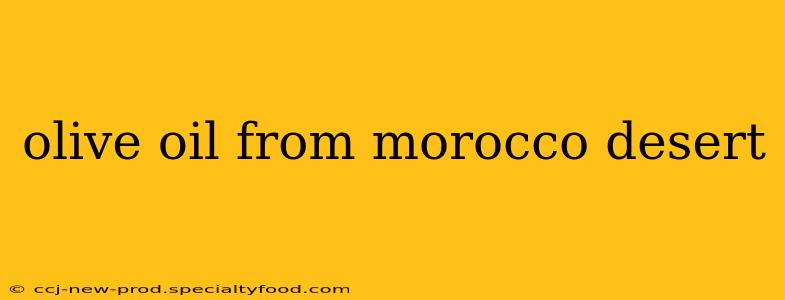Morocco, a land of vibrant culture and diverse landscapes, boasts a rich olive oil tradition, extending even to its seemingly inhospitable desert regions. While the image of lush olive groves might not immediately spring to mind when picturing the Moroccan desert, the reality is more nuanced. This article delves into the unique characteristics of olive oil produced in Morocco's arid zones, exploring its production, flavor profiles, and the challenges faced by those who cultivate it.
What Makes Moroccan Desert Olive Oil Unique?
The harsh conditions of the Moroccan desert—intense sun, scarce rainfall, and extreme temperature fluctuations—shape the character of the olives grown there. These olives, often smaller and more concentrated in flavor compounds, yield an oil that differs significantly from those produced in more temperate climates. The resulting oil is often described as having a more intense, complex flavor profile, sometimes with hints of herbs, nuts, or even a slight bitterness. This intensity is a direct result of the olives' struggle for survival in challenging conditions; they develop richer flavor compounds as a defense mechanism.
Where in the Moroccan Desert is Olive Oil Produced?
While not widespread across the entire desert, olive cultivation exists in specific regions. Areas bordering the Sahara Desert, such as parts of the Drâa Valley, and certain oases, support olive groves. These regions benefit from localized water sources, often from traditional irrigation systems, allowing for olive tree growth. It's important to note that olive oil production in these areas is often small-scale and traditional, contributing to its unique quality and character.
Is Moroccan Desert Olive Oil Better Than Other Olive Oils?
The "better" olive oil is subjective and depends entirely on personal preference. Moroccan desert olive oil stands out due to its unique flavor profile, a direct consequence of its challenging growing environment. It's not inherently "better" than other olive oils, but it offers a distinct flavor experience that some individuals highly value. The quality of any olive oil ultimately hinges on factors like the olive variety, harvesting methods, and processing techniques.
What are the Health Benefits of Moroccan Desert Olive Oil?
Like other high-quality olive oils, Moroccan desert olive oil is rich in monounsaturated fats, antioxidants (particularly polyphenols), and vitamin E. These components are associated with numerous health benefits, including improved heart health, reduced inflammation, and potential protection against certain chronic diseases. However, it's crucial to remember that these benefits are largely associated with regular consumption as part of a balanced diet. No single food, including Moroccan desert olive oil, can guarantee perfect health.
What is the Difference Between Moroccan Argan Oil and Olive Oil?
This is a common point of confusion. Argan oil and olive oil, while both native to Morocco, are derived from entirely different plants. Argan oil is extracted from the kernels of the argan tree, while olive oil is, of course, from olives. They have distinct flavor profiles and nutritional compositions. Argan oil tends to have a more nutty and slightly sweet taste, while olive oil's flavor can vary significantly based on the variety and growing conditions, as discussed above.
How Can I Find Authentic Moroccan Desert Olive Oil?
Finding authentic Moroccan desert olive oil might require some research. Look for smaller producers or brands that specifically highlight the origin of their olives in the desert regions of Morocco. Be wary of generic labeling and prioritize brands with transparent sourcing practices. Checking online reviews and seeking recommendations from individuals familiar with Moroccan cuisine can also be beneficial. The lack of widespread large-scale production means that supply might be limited.
Conclusion
Moroccan desert olive oil represents a unique and intriguing niche within the world of olive oils. Its distinct flavor, born from the challenging conditions of its production, offers a captivating culinary experience. While further research is needed to fully characterize its specific properties, its potential health benefits, alongside its rich cultural heritage, make it a fascinating subject for food enthusiasts and health-conscious consumers alike.
